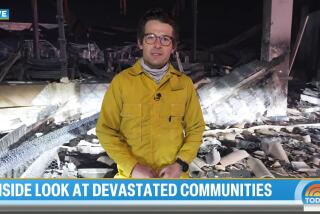Six Stories of Rubble: An Unreal Land All Its Own
- Share via
NEW YORK — As they emerge, dusty and grim-faced, from the wreckage of the World Trade Center, rescue workers keep saying the same thing: You can’t fully understand it unless you have been there.
They mean the pile, the massive mountain of debris left from Tuesday’s catastrophic attack on New York’s tallest buildings. Long-distance television shots don’t convey its bewildering size and strangeness. At night, when the pile glows under powerful lights, it is a malevolent presence reigning over an unreal landscape.
New York Police Officer Mike Goldreyer stands, awe-struck, during a break early Saturday. Crews work for hours, he says, but the debris pile looks the same.
Throughout the night, generators drone loudly. Beams of light glint off the six-packs of bottled water stacked by the hundred on the pavement nearby. Streams from fire hoses arc high in the air. White smoke and steam billow ceaselessly against the night sky.
At its north edge, the pile rises from three stories high to more than six. Rescue workers say that when they get on top, it’s like entering an insane, new country with its own geography of hills and valleys. Hellish and insurmountable.
And there is emotion in every inch of the wreckage. Here are “friends, brothers, mothers,” says Officer Peter Shrine.
The jagged gray bluff rises above the work cranes. Steel beams add flashes of yellow and russet. Close up, they are crumpled like paper straws, or gently curved like the hull of a boat.
Despite a real danger of shifting, the wreckage viewed from the street seems an inert, solid mass. Bent lengths of steel are tightly entangled. Swiveling cranes must yank hard to extract anything.
When they approach the pile for the first time, workers say, they need a few moments just to process what is before their eyes. Even seasoned crew members frequently spend their breaks just standing and staring.
Goldreyer, along with his bicycle patrol team from the Bronx, is among those working on this cold but mercifully dry night. He has been on the NYPD for just a year and a half. He has never attended a police funeral before.
Members of the force are being exposed to death on an unimaginable scale. Officers are retrieving body parts, escorting them through the morgue, talking to bereaved families.
Moment by moment, hour after hour, workers move chunks of concrete and sift through rubble. “You are just moving stuff from here to there,” Shrine says. It is a learn-as-you-go assignment. The ironworkers impress everyone with their ability to scramble across high beams, the firefighters with their broad knowledge of power tools.
“I learned to use a rebar cutter,” Goldreyer tells his companions. “They don’t teach you that in the academy. I didn’t even know what rebar was before this.”
The pile at night is a punishing environment of smells, noise, blinding lights and acrid air that instantly chaps lips and reddens eyes. There is the smell of death.
The Bronx police officers help remove the remains of six people, handing black body bags in baskets, relay-style, off the debris pile. One body is identified as a firefighter. A white helmet nearby is strapped to the bag.
At one point, even a search dog succumbs to exhaustion. Handlers put an oxygen mask over its face and administer an IV while carrying the dog out on a stretcher. “The smell is bad for us; imagine what it was like for him,” Officer Josh Kaveny says.
Although police control of ground zero is tight, a swarm of people come and go in the surrounding blocks. There are Salvation Army volunteers, fast-food workers and a constant stream of trucks. So many packages of food, clothing and beverages have been donated that stacks are blocking the sidewalks. Sanitation workers are called to haul some away. On one corner, chiropractors Gary Deutchman and Rich Nunziata set up benches. They offer free services to rescue workers with sore backs, convincing many skeptics to give it a try.
As the sun rises, exhausted firefighters slouch in the high platforms above their trucks, monitoring the gushing hoses. Workers talk about the attack, voicing support for merciless and sweeping retribution. A construction worker suggests an alternative punishment: “We should make them come in and clean this mess up.”
More to Read
Sign up for Essential California
The most important California stories and recommendations in your inbox every morning.
You may occasionally receive promotional content from the Los Angeles Times.













